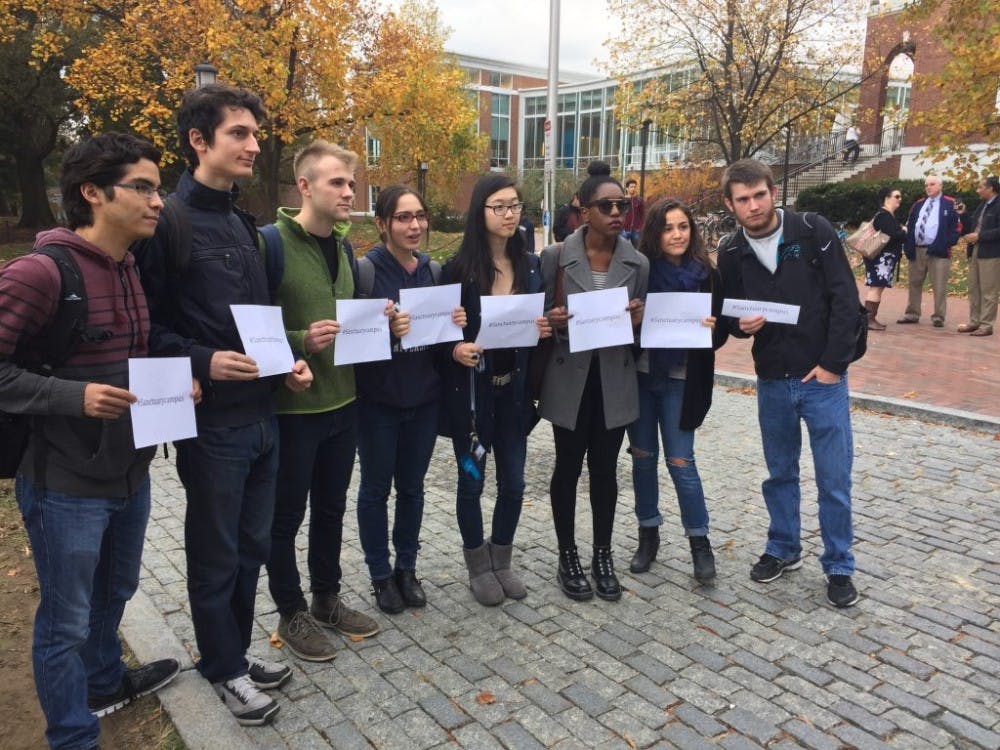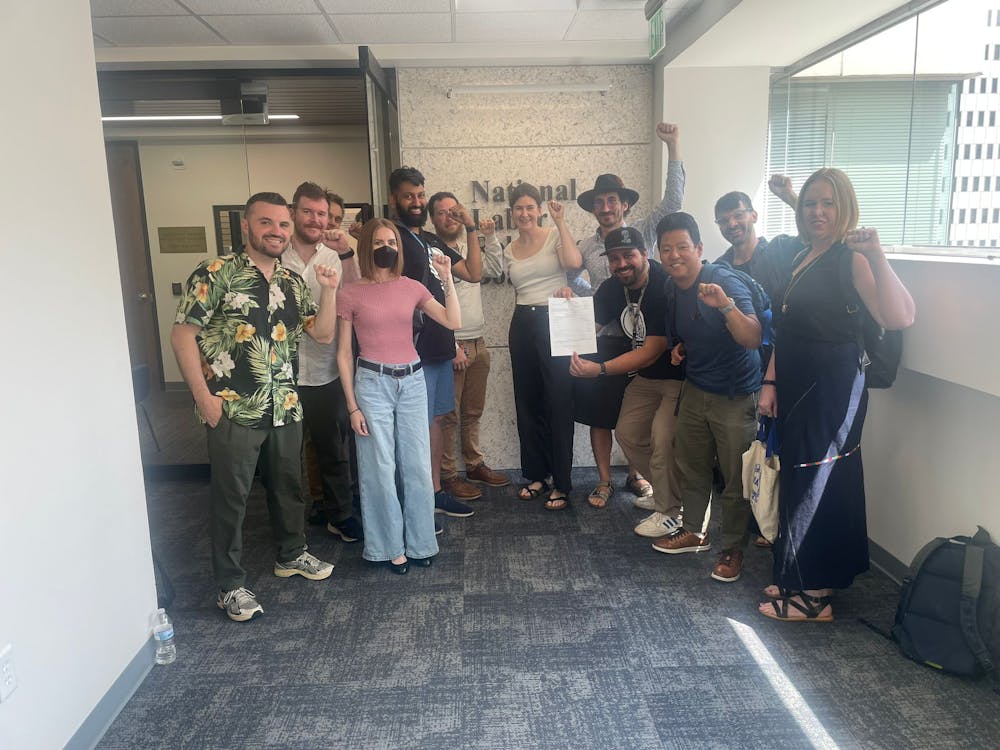The Trump administration announced its intention to end the Deferred Action for Childhood Arrivals (DACA) in six months.
This statement, which came last Tuesday, leaves nearly 800,000 undocumented immigrants in the U.S with an uncertain future.
The Obama Administration implemented DACA through an executive order in 2012 to grant protections to undocumented minors, also known as Dreamers. Dreamers are able to renew two-year periods of protection from deportation and receive work visas.
U.S. President Donald Trump has asked Congress to come up with a legislative alternative to DACA before these six months are over.
Sofia Medina-Pardo, a former undocumented immigrant, became a permanent resident of the U.S. in 2014. She transferred to Hopkins shortly afterwards and graduated two years later. She said that Dreamers are often integral to supporting their families and communities.
“For me it’s devastating, because I know a lot of people who are affected,” Medina-Pardo said.
She said that while DACA was an imperfect policy, it alleviated fears of deportation and gave Dreamers opportunities that were previously inaccessible.
“I have friends who are on DACA who have graduated law school and medical school,” Medina-Pardo said. “If they didn’t have DACA they wouldn’t have the worker authorization and the social security number to apply for these professions.”
She expressed concern for the livelihoods of Dreamers who consider the U.S. their home.
“The U.S. is the place they’ve grown up in, the culture they have assimilated into, that they’ve grown up knowing,” she said. “For a lot of them, going back to their country is like going back to a new country.”
Medina-Pardo said that she does not believe that any Dreamers study at Hopkins. She believes that this is due to what she perceives as the University’s failure to establish clear institutional aid measures for undocumented students.
“If you google Johns Hopkins, undocumented students policies, there’s nothing,” she said. “But if you google Harvard or UPenn or Cornell, they have clear policies for undocumented students.”
While she commended University President Ronald J. Daniels for issuing his statement in support of DACA recipients, she believes that the University needs to be more proactive about opening doors to undocumented students.
Director of Multicultural Affairs Joseph Colon said that the Office of Multicultural Affairs (OMA) is working to promote a dialogue about the DACA decision on campus.
“Our office is all about having conversations that look at different viewpoints,” Colon said. “I think the next step will be for us to work with student organizations and community organizations to do a larger forum, to talk about the specifics of institutional support for DACA students, and also how we can access resources outside of campus to help foster this community.”
He said that while OMA has a key role to play, it is crucial that faculty, students and staff be actively engaged.
Colon also praised the University for quickly issuing a statement in support of DACA recipients and suggested that it serve as a guideline for the Hopkins community.
“The work isn’t just ours,” Colon said. “The next steps for our community are to be there. To be supportive. As an office we need to continue to have these conversations. We can’t have these one and done situations. There’s a lot of players that need to be at the table.”
Colon recommended that students seek peer-to-peer interactions to cope and he referred to the Office of International Student Services (OIS) and the Counseling Center as helpful resources.
Colon added that while Hopkins lacks “continued, robust activism,” students are becoming increasingly conscientious. He hopes students will continue being more participatory in their communities.
“America has always had that tagline: This is where you find opportunity,” Colon said. “DACA and immigration as a whole — it’s a conversation about how to fix an immigration system that is not working and supporting an influx of possibilities.”
He addressed how Trump’s move to end DACA impacts Hopkins.
“Whether or not you’re affected, it’s still part of the community, and it touches the story of what’s happened and what has been happening for the past few decades,” Colon said.
Last Thursday, OMA hosted a drop-in session focused on DACA. Colon served as moderator for the discussion and said that the drop-in served as a safe space for students to reflect on Trump’s decision and share personal stories as well as ideas on actions the Hopkins community could take in response.
“I was really inspired by the students and the fact that they wanted to learn not just more about DACA was, but what our next steps were,” Colon said.
Colon was impressed with the response of students who attended the drop-in.
“The beauty of what transpired at that meeting was they just wanted to do something, to protect the students, to support their education, to help them finish their education,” he said.
He expressed his admiration of students who were open about personal struggles.
“Just for our students to bravely put themselves out there was phenomenal,” he said. “The personal stories that were told, I was really touched with the fact that people were vulnerable and at the same time powerful with their concerns. That’s a piece of Hopkins we need to explore more with our students.”
On Monday, the Student Government Association (SGA) sent students a database of resources and legal information related to DACA.
SGA Executive Vice President AJ Tsang was present at the drop-in and felt it offered a secure environment for concerned students.
“I enjoyed it because it was a warm, tight-knit setting where we could feel safe and protected,” Tsang wrote in an email to The News-Letter. “We felt comfortable to express our rawest emotions, whether it was despair or fury at Trump’s ignorance and apathy.”
Tsang also praised Colon for his handling of the situation.
“In addition, Mr. Colon not only moderated the discussion well, but was a truly supportive presence too,” Tsang said.
Tsang emphasized that the SGA’s effort to send out a list of resources for those affected by DACA was unprecedented.
“No SGA in recent memory [has] embarked on such an endeavor,” Tsang wrote. “It is in line with our goal to have more tangible, quantitative resources available to students this year. We moved DACA to the forefront of such database creation due to the fact that time is slipping [away]. With the October 5th DACA renewal deadline looming, it was imperative we rapidly move to protect students by giving them a chance to apply for status renewal.”
Some other college campuses have been more vocal about opposition to Trump’s announcement. For example, students have held rallies at Harvard University, Cornell University and the University of Virginia.
Sophomore Sumera Yego said that students hadn’t protested because of Daniels’ statement last week supporting DACA recipients.
“I’m sure the fact that the institution came out [with the statement] as soon as it happened saying we do not stand by this, we’ll provide support, sent a clear message so that any protest here would have lacked purpose,” she said. “Students don’t just protest because an event has happened, they protest because they believe that the institution that they have is not reflecting their interests.”
Junior Joseph Klein expressed his opposition to deporting all undocumented immigrants, saying that they provide a sizable economic benefit but was critical of DACA and its implications.
He expressed hopes that Trump’s decision will steer the government in what he views as the right direction when it comes to immigration.
“Immigration is an ultra-complex issue, and I don’t want any President ruling on immigration by executive order, be it Trump unilaterally ending DACA or Obama’s illegal executive amnesty,” he said. “I was encouraged when Trump left it up to Congress to reform DACA and related immigration programs. I’m glad that our Representatives can weigh in during an open discussion.”
Klein said he believes that the government should take a balanced approach.
“It makes no sense from an economic and human rights standpoint to round up and deport 11 million people, but it also doesn’t make sense to give them full citizenship since they did break the law,” Klein said. “A different sort of legal status would suffice.”
Junior Valentina D’Empaire, the public relations chair for the Society of Hispanic Professional Engineers, has a scholarship from the Jack Kent Cooke Foundation, which does not require students who apply to disclose their legal status.
While she is not a Dreamer, she said that the move toward repealing DACA nevertheless affects her because many of her friends who she met through the Foundation are DACA recipients.
She added that she does not know anyone at Hopkins who is a DACA recipient.
D’Empaire feels that in general, the student body lacks awareness about DACA and has adopted an indifferent attitude towards it.
“I don’t think the general population of Hopkins has paid attention to it,” D’Empaire said. “I don’t think there is a sentiment of the student community saying we stand with this, we stand for DACA or against DACA.”
D’Empaire is concerned that the Hispanic community at Hopkins, unlike those at other campuses, is not large enough to help incite student activism.
“The majority of DACA recipients are Hispanics,” she said. “Maybe schools in California, Texas and Florida are more active and participatory in showing their standing, but Hopkins doesn’t have much of a Hispanic community.”
According to the Associated Press, Trump told lawmakers on Wednesday that he would be willing to agree to bipartisan legislation protecting Dreamers from deportation, while also strengthening borders between the U.S. and Mexico. Congress has six months to arrive at a compromise.





